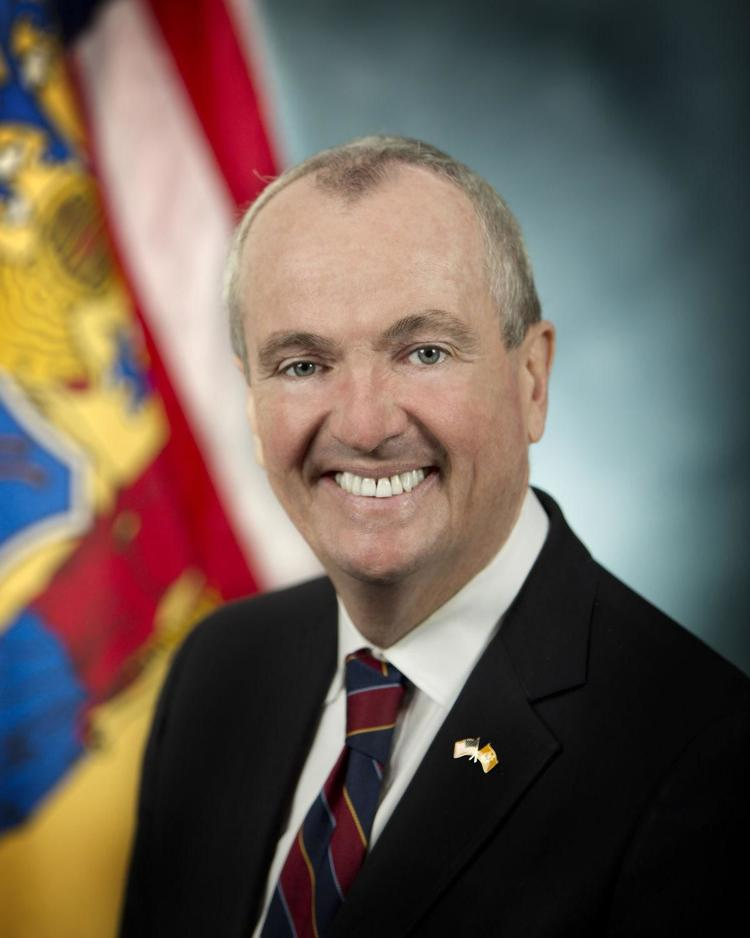Quick Links

Murphy Presents Fiscal Year 2022 Budget

TRENTON – Gov. Phil Murphy Feb. 23 delivered his fourth annual budget address, outlining a responsible spending proposal for fiscal year 2022 (FY2022) that includes critical investments to help New Jersey emerge from the pandemic stronger, fairer, and more resilient, while making a full pension payment for the first time in more than a quarter of a century, providing the highest level of school funding in history, delivering direct tax rebates to over 760,000 middle-class families, and providing $200 million in relief for small businesses.
“This budget lives up to our stronger and fairer mission,” stated Murphy, in a release. “Stronger to come out of the pandemic with an economy that works for every New Jersey family. Fairer to help families and small businesses hit hard and left behind in the pandemic's brutal wake.
"This budget will continue to stabilize property taxes for hardworking families. This budget will continue the hard work of moving forward – not only from the pandemic – but from years of neglect. Our problems weren’t created overnight and, frankly, they won’t be fixed overnight, but I know that brighter days lay ahead.”
The proposed FY2022 budget makes good on the governor’s promise to public employees by including an additional $1.6 billion to meet the goal of contributing 100% of the Actuarially Determined Contribution (ADC) to New Jersey’s pension system a year earlier than initially planned.
The proposed $6.4 billion pension payment, which includes contributions from the state lottery, would mark the first time the state has made a full contribution since FY1996.
The state has been on a 1/10 ramp up plan as it works its way up to meeting the full pension contribution and was initially slated to contribute 90% of the full contribution this year.
The governor’s decision to make a 100% contribution a year early will substantially reduce the state’s obligation in the coming years, saving taxpayers $861 million over the next 30 years.
The combined pension contributions by the Murphy administration in four years will roughly total an unprecedented $18 billion, which is $9.4 billion more than the prior governor contributed over two terms.
The $44.83 billion spending proposal assumes 2.4% growth in total revenue and includes a sizable surplus of $2.193 billion, just under 5% of budgeted appropriations and dwarfing the average of the previous administration.
Revenue projections have improved in part due to record high stock markets, federal stimulus that directly aided individuals and businesses, as well as what economists describe as a K-shaped recession, which has seen middle and high-income households recover more quickly while low-income households have continued to struggle.
The budget proposal aims to address these inequities by directing resources where they are needed most in order to build a stronger post-pandemic New Jersey.
The governor is committed to investing significant resources to ensure the state does not repeat the same mistakes made during the Great Recession when New Jersey was one of the last states to recover from the financial crisis after drastically cutting state aid.
As a result of last year’s millionaires tax enactment, the proposed FY2022 budget includes $319 million in direct tax relief for middle-class families, which will provide up to a $500 rebate to over 760,000 couples and individuals with qualified dependents.
The budget also includes $1.25 billion in funding to support various property tax relief programs. Additionally, it includes funding to:
- Expand the veterans’ property tax deduction to those who served in peacetime;
- Make the child and dependent care credit refundable and expand eligibility to families making up to $150,000, more than doubling eligibility to aid 148,000 taxpayers; and
- Expand eligibility for the earned income tax credit to roughly 70,000 senior citizens without dependents.
The proposed budget also includes a new multi-departmental economic growth initiative that will boost economic recovery in New Jersey communities, provide access to capital for minority-owned businesses, and help government support sustainable economic growth.
This roughly $200 million investment initiative includes:
- $100 million allocated from the recently passed Economic Recovery Act Main Street Recovery Finance program ($50 million is available in FY2021 and an additional $50 million is proposed for FY2022);
- $25 million for EDA’s lending programs such as Premier Lender and Microbusinesses;
- $20 million for the NJRA’s Urban Site Acquisition Fund and Redevelopment Investment Fund, the first state investment in the NJRA since 2002;
- $15 million for permit modernization across state departments and for local governments;
- $13.5 million for the Department of Transportation’s Local Aid and Economic Development Grants, including the Transit Village, Safe Streets to Transit, and Bikeways programs;
- $10 million for EDA’s Black and Latinx Seed Fund initiative;
- $6.5 million for DCA’s Neighborhood Preservation Program and Main Street New Jersey, allowing each to expand to significantly more communities;
- $5 million for the Department of State’s Business Marketing Initiative;
- $3.2 million for the Commission on Science, Innovation and Technology;
- $1 million for EDA’s NJ Ignite; and
- $500,000 to double funding for EDA’s Small Businesses Bonding Readiness Assistance program
The proposed FY2022 budget furthers the governor’s historic commitment to education by increasing formula aid by $578 million. Over the last four years, direct pre-K through grade 12 spending statewide has increased by nearly $1.5 billion, putting New Jersey on the path to fully funding the constitutional school funding formula.
The governor’s proposed budget will:
- Expand the state investment in pre-K by $50 million, including $26 million for new programs.
- Increase Extraordinary Special Education Aid by $25 million; and
- Provide $50 million in Stabilization Aid.
Additionally, the proposed budget boldly strives to make higher education more attainable for more New Jersey students and further assist colleges by:
- Allocating $50 million to fund The Garden State Guarantee, which provides two years of free tuition at four-year institutions for students with household incomes of less than $65,000;
- Investing $27 million in the Community College Opportunity Grant (CCOG) program, which provides tuition-free community college for eligible students;
- Increasing funding for the Educational Opportunity Fund (EOF) by $2.8 million for a total of $51.8 million, which will cover the identifiable undergraduate student capacity needs for the academic year for the first time; and
- Increasing aid to community colleges by $5 million, aligned with an outcomes-based framework.
The budget proposal also includes significant quality of life investments to make New Jersey a healthier and more affordable place to live, including:
- Investing an additional $25 million in NJ Health Plan Savings subsidies;
- Launching the "Cover All Kids" initiative with the ultimate goal of ensuring affordable, accessible health coverage is available to nearly 88,000 children without coverage;
- Raising the income threshold by $10,000 for the Pharmaceutical Assistance for the Aged and Disabled and Senior Gold programs, which will benefit over 20,000 seniors;
- $19 million to support the new Reproductive Health Care Fund, which will cover costs for contraceptive, prenatal, labor, and delivery care for those without access to medical assistance;
- $19.5 million for Family Planning Services, bringing the total the Governor will have provided over four years to nearly $74 million, after years of defunding by the prior administration;
- $8.5 million to expand Medicaid coverage for 365 days postpartum and $2 million to create a new pilot program to support rental assistance for expecting mothers, both of which will advance the First Lady’s Nurture NJ initiative; and
- $20 million for the Housing and Mortgage Finance Agency’s Down Payment Assistance program, providing nearly 2,000 mortgages for first time homebuyers.
The governor is also proposing significant direct appropriation investments, including $200 million for the Offshore Wind Port and $200 million for current Schools Development Authority (SDA) projects to reduce debt issuance; $75 million for the SDA’s Capital Maintenance and Emergent Needs Grant program; $60 million to support the continuation of the Drinking Water and Clean Water Infrastructure Fund; and $86.6 million for critical capital improvements, including emergent life safety and IT projects.
The FY2022 budget proposal also increases total resources for NJ Transit to $2.65 billion, 9% over FY2021 and 15% over FY2019. It also continues to reduce diversions from the agency’s capital fund for operating costs, marking the lowest transfer in 15 years, and for the fourth consecutive year there will be no fare hike.
The proposed budget also continues to build on the progress the Murphy administration has made to address the inequities in New Jersey’s criminal justice system by including funding to help lessen the burden on individuals seeking expungement of criminal records; equip local police officers with body-worn cameras; develop software to make law enforcement forfeiture actions more transparent; allow incarcerated individuals placed in isolated confinement to undergo daily examinations by health professionals; and support implementation of the “Earn Your Way Out” law.
Additionally, the proposed budget includes both new and increased investments for the Juvenile Justice Commission (JJC) and the Department of Corrections (DOC):
- $5 million to improve internet infrastructure for DOC’s incarcerated population to access education, employment, and legal materials;
- $4.2 million more for county Youth Services Commissions to reduce juvenile delinquency;
- $3 million to help fund non-profits that facilitate re-entry;
- $2.25 million for the Scholarship and Transformative Education in Prison Program; and
- at least $2 million in support for a new career training program at JJC and an apprenticeship program and other career services for DOC inmates.
For more information on the governor’s proposed budget and policies, check out the Budget in Brief online.
Additional one-page policy papers on the central commitments that have underpinned Murphy’s first four budget proposals – record pension payments, historic education funding, rebuilding NJ Transit, investing in economic growth, expanding access to housing, and continuing progress on criminal justice reform – are also available here.
Statements on the FY2022 Budget:
Chamber of Commerce Southern New Jersey
The following is a statement from Christina Renna, president and chief financial officer, Chamber of Commerce Southern New Jersey:
“The Chamber of Commerce Southern New Jersey (CCSNJ) is pleased that Gov. Phil Murphy did not include tax increases in the proposed FY2022 state budget.
"The business community continues to be greatly impacted by the Covid pandemic and any increase in taxes would only add to the severe affordability crisis that businesses and residents of New Jersey face.
"Although the decision to make the full pension payment is welcome news, the CCSNJ continues to support substantive fiscal reforms, such as those proposed in the Path to Progress report, which have the potential to put New Jersey on a healthier fiscal path for years to come.
"Additionally, while the CCSNJ applauds the addition of another $50 million to the Main Street Recovery Fund, as well as other smaller proposed allocations for differing economic programs, more resources are needed still for small businesses to enable them to recover.
"The CCSNJ looks forward to engaging with the administration and the Legislature during the FY2022 budget process to identify ways to help the business community recover and evolve from the pandemic stronger.”
New Jersey Business and Industry Association
NJBIA President and CEO Michele Siekerka issued the following statement regarding Gov. Phil Murphy’s proposed FY2022 budget:
“NJBIA welcomes Gov. Murphy’s efforts to prepare a state budget that contains no taxes or raised fees. This decision is as appropriate as it is appreciated, given the increased tax burdens on businesses and residents over recent years which have greatly contributed to New Jersey’s current surplus.
“The governor also deserves credit for committing to New Jersey’s first full pension payment since 1996, and for looking to reinvest in our great state through appropriations for education, infrastructure, innovation and small business.
"These are positives, all of which NJBIA called for prior to today’s budget address, as New Jersey businesses have continued to provide robust revenues commensurate with already having the highest corporate business tax and second highest top income tax rate in the nation.
“As we await more details on the FY22 budget, we do continue to have strong concerns about the sustainability of New Jersey’s overall spending. If the proposed $44.8 billion number holds for FY22, it would mean New Jersey’s signed budgets will have increased more than 29% over the last four fiscal years.
“If the investments we heard today are to be sustainable in FY23 and beyond, our state will certainly need more fiscal discipline. A reprieve from new taxes cannot be an election year special. Despite the strong pension payment put forth by the governor today (Feb. 23), New Jersey’s pension and benefits system remains wholly unsustainable.
"New Jersey’s overall fiscal health will only be truly cured by a real commitment to cost savings and structural reforms as found in the Path to Progress report. NJBIA continues to call for these reforms as part of a comprehensive economic plan.
“NJBIA looks forward to working with the Murphy administration and the Legislature during this budget season to help further address New Jersey’s long-term affordability, to bring further and immediate support to small business in this historic time and to galvanize our economy for the benefit of all our citizens.”
New Jersey State League of Municipalities
NJLM President, Clinton Town Mayor Janice Kovach reacts to Gov. Murphy’s Fiscal Year 2022 Budget Address:
“Every day, municipalities are on the front lines of efforts to reduce property taxes while ensuring strong public safety, roads free of snow, recreation options, and public health services.
"While there is much in this budget to applaud and be proud of, it needs to be noted that the lowest increase in property taxes during this administration has been accomplished with flat municipal funding.
"While flat funding predates the Murphy administration, since the state is experiencing more optimistic revenues projections than anticipated even a few shorts months ago, the League believes now is the time to engage in a robust discussion about full restoration of municipal aid.
"This has languished for more than a decade and we stand ready to work with governor and legislative leadership to ensure municipalities have the necessary resources to ensure communities are well served.”
Sen. Michael Testa (R-1st)
Sen. Michael Testa (R-1st), a member of the Senate Budget and Appropriations Committee, said Gov. Phil Murphy’s budget proposal for FY2022 fails to address problems with the state’s unemployment system and a looming tax increase on struggling employers:
“It’s clear that Gov. Murphy’s budget doesn’t get the job done on fixing major problems with New Jersey’s unemployment system.
“Despite having a multi-billion budget surplus, the governor isn’t dedicating a single penny into shoring up our UI Fund, which incurred debt last year after people were put out of work by his executive orders. Through his failure to act, Murphy is letting a major tax increase on employers take effect July 1.
“The governor also didn’t explain what resources he will dedicate to fixing an ancient computer system that has made it impossible for unemployed workers to get the benefits they’re owed in a timely fashion.
"By glossing over this in his speech, it seems likely he’ll propose another band-aid fix rather than the full upgrade that’s needed to support out-of-work New Jerseyans.”
Additional Info
Source : https://www.capemaycountyherald.com/news/government/article_09a78f94-761d-11eb-9f77-7ffb825c5d3e.html












